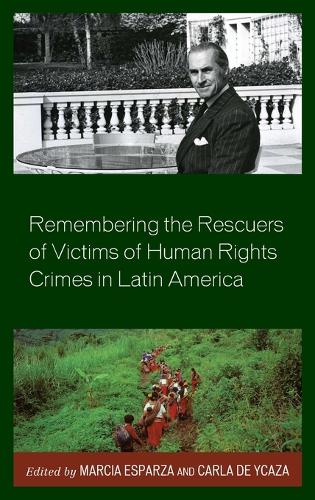
Remembering the Rescuers of Victims of Human Rights Crimes in Latin America
(Hardback)
Publishing Details
Remembering the Rescuers of Victims of Human Rights Crimes in Latin America
By (Author) Marcia Esparza
Edited by Carla De Ycaza
Contributions by Stephanie Alfaro
Contributions by Jeffrey Blustein
Contributions by Pascale Bonnefoy
Contributions by Roddy Brett
Contributions by Jessica Casiro
Contributions by Isabel de Len Olivares
Contributions by Jenny Escobar
Contributions by Marcia Esparza
Bloomsbury Publishing PLC
Lexington Books
20th December 2016
United States
Classifications
Professional and Scholarly
Non Fiction
Sociology
Crime and criminology
History of the Americas
323.098
Physical Properties
Hardback
218
Width 159mm, Height 240mm, Spine 18mm
454g
Description
This book explores the significance of remembering the rescuers denouncing human rights crimes as well as protecting and sheltering targeted victimsincluding the deadduring the Cold War state violence in Latin America. In light of newly unearthed archival evidence, testimonial memories, and the continued mobilization of human rights groups to preserve Cold War memory, this timely book moves beyond the victim-perpetrator dichotomy and its discursive studies to focus on those whose moral courage and righteous acts were beacons of hope in the midst of extreme violence. Remembering Latin American righteousness, a term used in Holocaust literature, is important in recognizing that those who resisted human rights violations and protected victims yesterday are those who often keep the collective memory of that past alive today.
Reviews
The least noticed aspect of genocide is the courageous resistance that is often put up to save the victims. This collection shows how victims were helped during Cold War violence in Latin American countries including Guatemala, El Salvador, Argentina, Chile and Colombia. The rich exploration of historical cases enhances our general understanding of "rescue", showing that it is not just a matter of bystander intervention but of solidarity among victims. This is an important collection that deserves a wide readership. -- Martin Shaw, emeritus, University of Sussex
A much-needed and relevant collection of essays on a rarely studied topicrescuers of human rights violations in Cold War Latin America. Who were the rescuers and how and why did they risk their lives to save others By examining cases arising in a number of national contexts, the volume provides a valuable contribution to previous discussions about the figure of the rescuer and the political and moral duty to remember that have long characterized Holocaust studies. It explores the tension between a historically and geographically broader reading of acts of humanity on one hand, and concrete historical contexts on the other, delivering hopeful and inspiring insights.
Author Bio
Marcia Esparza is sociologist and associate professor in the Department of Criminal Justice at John Jay College of Criminal Justice, CUNY. She is the Founder and Co-Director of the Historical Memory Project (HMP). Carla De Ycaza teaches at the Center for Global Affairs at New York University and serves as editor of Dialogues on Historical Justice and Memory Network at Columbia University.
